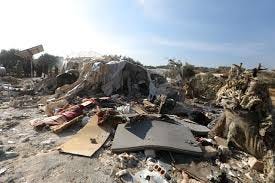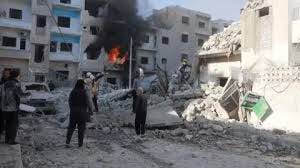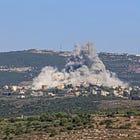The Anti-Assad flare up in Syria and Geopolitical implications
The recent developments in Syria are not just a national issue, but a significant geopolitical concern with wide-reaching implications.
Hezbollah and Israel recently agreed to a temporary ceasefire. Given that these two entities have been relentlessly pursuing each other’s downfall, this decision has raised eyebrows. However, the underlying motive seems clear: Hezbollah, the Iran’s puppet Shia militant group is shifting its focus to Syria. By halting its conflict with Israel, Hezbollah appears to be freeing up resources to confront HTS, which it sees as a direct threat to Iranian influence and the Assad regime.
Hay'at Tahrir al-Sham (HTS) is a Sunni Islamist group dominating parts of Syria. They have made headlines with its bold moves against the Assad regime. Once a coalition of factions with roots in al-Qaeda, HTS has transformed into a formidable entity governing parts of Idlib and other areas in northwest Syria. Recently, the group's increasing military activities and an audacious display of arms have drawn global attention. HTS have recently captured Hama, Syria's fourth-largest city, following their takeover of Aleppo. These coordinated offensives mark a significant blow to President Bashar al-Assad's regime, which has been backed by Russia and Iran.
Tehran views Syria as a strategic ally and a key part of its "Resistance Axis" against Western and Israeli influence. Iran’s support for Assad includes military aid through its Islamic Revolutionary Guard Corps (IRGC) and proxy militias like Hezbollah, which have been crucial in defending Assad’s government.
Iran and Hezbollah view HTS as not only a military threat but also a symbol of Sunni resistance against Shia dominance in Syria. This sectarian antagonism is fueling a potential confrontation. Iran, relies on Hezbollah as its key ground force in Syria.
Suggested Read:
“They will not be able to achieve their goals despite what they have done in past days, and we as Hezbollah will be by Syria’s side in thwarting the goals of this aggression as much as we can,”
- Sheikh Naim Qassem (Hezbollah)
Hezbollah had played a significant role in Syria alongside Iranian and Russian forces in the ongoing civil war started in 2011. While exact numbers are not always disclosed, reports suggest several thousand Hezbollah fighters remain in Syria, particularly in strategic regions like Latakia, where they have taken over some areas previously held by Russian force. The recent HTS advancement would prompt Hezbollah to have a direct confrontation with HTS in Syria.
Russian troops have already made some moves recently in Syria after the HTS advancements. While Russia has primarily targeted HTS as part of its military campaign in Syria, its primary concern is the security of the Tartus port, a critical naval facility. The rise of HTS threatens this strategic asset, potentially jeopardizing Russia’s long-term military and economic interests in the region.
Russia's geographic position limits its access to ice-free ports, which impacts its global naval and trade capabilities. Many of Russia's ports, such as those in the Arctic or along its eastern coast, are frozen for parts of the year, requiring icebreakers for access. This limitation has driven Russia to secure and maintain strategic ports like Tartus in Syria (in the Mediterranean) and Sevastopol in Crimea (on the Black Sea).
The US has been backing the Syrian rebels and the Kurdish-led Syrian Democratic Forces opposed to both the Islamic State and Syrian president Bashar al-Assad. The recent HTS’ advancement could be driven by Joe Biden’s interests. Biden sees the Syrian conflict as part of the broader geopolitical contest with Russia and Iran. His administration has been critical of Russia’s military role and Iran’s influence through proxies like Hezbollah, aiming to curtail their foothold in the region.
“President Joseph R. Biden, Jr. spoke on Monday with U.S. service members responsible for numerous successful counterterrorism operations in Iraq and Syria that significantly disrupted the ability of the Islamic State of Iraq and Syria (ISIS) to plan, organize, and conduct attacks in the region and beyond. The President noted that over the last 60 days, U.S. military forces often working together with local partners have conducted nearly 100 operations against ISIS terrorists leading to the removal of 32 ISIS leaders, the uprooting of external attack planning cells, and the destruction of training camps and hideouts. This relentless and targeted pressure on ISIS has been a hallmark of the Biden-Harris administration’s approach to counterterrorism, and we continue to be vigilant as we work every day to protect the American people and our allies and partners from harm. President Biden expressed his deep gratitude to the brave members of the military, their teams, and their families for their service to the country, and he recognized their courage and heroism. He also inquired about the recovery of the service members who were injured during these operations and was thankful to learn that they are doing well.”
A White House press release from first week of November reveals that US forces is working with various local partners in Syria.
“Nothing has changed with respect to our policy on [Syria’s President Bashar al-Assad. He’s a dictator with blood on his hands”
- Matthew Miller (Spokesperson for the United States Department of State)
On Monday , US State spokesperson Mathhew Miller told Reuters that there is no change in no change in Biden’s Syria policy.
Biden’s foreign policy on Syria is contradictory to Trump’s policy which focus on minimal intervention in Syria.
A December 2019 interview by political scientist Mr. Nuño Rodríguez, founder and director of the Quixote Globel with Dr. David Sorenson, a professor of international security studies, delves into the complexities of U.S. involvement in Syria and its geopolitical implications
“By 2015, aid to anti-Assad forces became the most expensive US covert action program in history, topping 1 billion USD. However, some of the funds and arms wound up in the hands of violent extremists, while some of the troops with the units funded by the United States defected to other groups, taking their arms with them” - (Sorenson interview)
Concerns about inefficiency and extremist infiltration led the Trump administration to terminate aid to anti-Assad forces in 2017. By then, the focus had shifted toward counter-ISIS operations rather than overthrowing the Assad regime.
The outgoing Biden team hopes to make bold moves against Russia and its counterparts by the time Trump is inaugurated, making it difficult for the incoming president to reset relations with Moscow or to launch any peace initiative in Ukraine.
From threating Georgia to impose sanctions and spending millions of money to overthrow the pro-Russian Alexander Lukashenko in Belarus, Biden continues to make bold geopolitical moves against his geographical adversaries.





